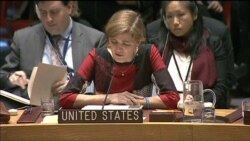The U.N. Security Council discussed the situation of human rights in North Korea on Friday, despite efforts by China to block it.
It was only the third time the 15-nation council has taken up the issue, usually reserved for other bodies, including the Human Rights Council and the General Assembly. The council has held what has become an annual meeting on the topic since December 2014.
“China is against deliberations by the Security Council on DPRK’s human rights situation,” China’s ambassador Liu Jieyi said as he tried to stop the public discussion going ahead. “The Security Council is not a forum for discussing human rights issues, and still less for the politicization of the human rights issue,” he said.
China failed to secure the necessary nine votes to derail the meeting. Only Russia, Venezuela, Angola and Egypt objected to the session.
While China objects to the discussion of Pyongyang’s human rights abuses in the council, it has not objected to additional targeted sanctions on the rogue regime for its nuclear and ballistic missile tests. Last week, Beijing joined the rest of the council in unanimously approving the latest round of tough measures aimed at bringing North Korea in line with its international obligations.
Rights Abuses
A 2014 Commission of Inquiry Report commissioned by the U.N. Human Rights Council, detailed widespread, systematic and gross human rights violations in the DPRK, including torture, arbitrary detention, enforced disappearances, executions and inhumane treatment.
"The deplorable human rights situation in the DPRK remains unchanged," U.S. Ambassador Samantha Power told council members.
WATCH: Power on North Korea's rights abuses
She said that 2016 has seen an increasingly aggressive North Korea, with numerous ballistic missile launches and two nuclear tests. “This behavior affirms what we have long stated - when governments flagrantly violate the human rights of their own people, they almost always show similar disdain for the international norms that help ensure our shared security,” Power said.
“The people in North Korea, as such, are destined to live a miserable life from the very moment of their birth, trapped in the state machinery that systematically tramples on their basic human rights,” said South Korea’s newly arrived U.N. Ambassador Cho Tae-yul. “The leadership in Pyongyang shamelessly employs a reign of terror merely for the sake of the survival of his regime,” he said in reference to North Korean leader Kim Jong-un.
“History teaches us that serious human rights violations are warning signs of instability and conflict,” U.N. Deputy Secretary-General Jan Eliasson told the council.
“The patterns of grave violations of human rights in the DPRK have repeatedly been established,” Eliasson said. “The authorities have given no effective commitment to remedy the situation,” he added.
North Korea continues to spend hundreds of millions of dollars on its illicit nuclear and ballistic missile programs. Meanwhile, the U.N. says some 70 percent of the population – about 18 million people – are food insecure. The U.N. says about $145 million are required to address the country’s critical humanitarian needs.






